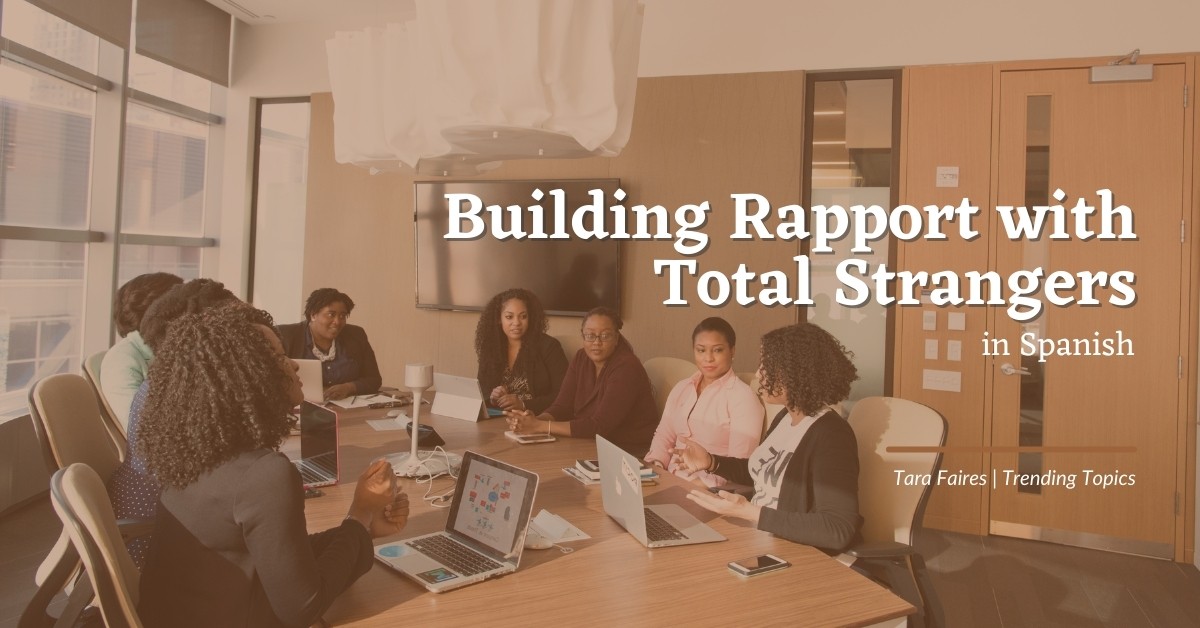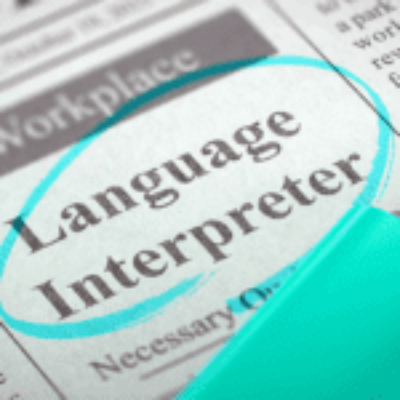
Building Rapport with Total Strangers in Spanish
Building rapport with colleagues and customers in Spanish is one of the most important components of being successful at your job. Let’s face it, we want to do business with people we like and trust – therefore you need to be likable and trustworthy!
So how do you build confidence with others and get people to enjoy doing business with you in Spanish? Start with a conversation.
Show Interest and Ask Questions
One of the most important points from the book The 7 Habits of Highly Successful People is the need to be an active and empathic listener. The author says:
“Most people do not listen with the intent to understand; they listen with the intent to reply.”
— Stephen Covey
If you want to build rapport in any language, you first need to genuinely understand what a person is saying and listen with your ears, eyes, and heart. Have an open mind. This will build mutual trust – and others will believe that you will act in their best interest – which then leads to positive problem solving and greater transparency in a business relationship. Active listening and showing real interest will help others be more willing to share concerns and achievements – and be more open and authentic.
Understand that business is done differently in Spanish-speaking countries, and this needs to be considered and respected. When listening, you want to have humility and be non-judgmental – this will give others the space and comfort to open up. Listening in this way is a strength and an attribute of a strong leader. Good listeners are savvy at acquiring information that is useful for doing business better – and knowledge is power.
For example, let’s say you are trying to understand why your customer can never deliver parts on time to meet your manufacturing schedule. As a result, this is impacting your company’s performance. You could approach your supplier and say:
¿Por qué envió el producto tarde otra vez? ¿Qué está sucediendo? No vamos a alcanzar nuestra meta financiera trimestral, lo cual es inaceptable.
“Why are you late again? What is going on?! We are going to miss our quarterly financial goal, which is unacceptable.”
This will immediately put your counterpart on the defense and likely be met with an excuse.
Let’s try something a little softer, more empathetic.
An alternate approach would be:
Bueno, si no cree cumplir con la fecha de entrega, por favor, muéstreme el proceso de la cadena de suministro – ¿Cómo se realiza el pedido? Y ¿cómo se entrega el producto? Trabajemos juntos en un plan de mitigación y desarrollemos un planteamiento alternativo para garantizar que los futuros productos se entreguen a tiempo.
“Ok, so you don’t think you’ll meet the timeline. Please, walk me through the supply chain process – how is the order placed, and how is the product delivered. Let’s work together on a mitigation plan and develop an alternative approach to ensure on-time delivery for future products.”
This shift in tone and willingness to listen to the process will give you far more results and a better working relationship – it shows that you have an interest in the mutual success of both companies.

Find Common Ground
It is important to respect cultural differences when working with a Spanish-speaking customer, and you need to find common ground to be successful.
Let’s say your customer is late to the telephone meeting AGAIN and you infer that they just don’t care about the business relationship. Take a step back and consider that this company is located in a different country and does business differently than you. Perhaps, being 10-15 minutes late is not meant to be disrespectful, but is in-line with normal business culture. Opening your mind and taking time to understand the country which you are doing business with will get you miles ahead. (Note that not ALL Latinos are late; this is just an example that some people will be consistently late, which may be cultural and is in no way meant to be disrespectful.)
If we want to accomplish our best, we must work well with other people. For example, you can be the best footballer/soccer player in the world, but if you are not surrounded by a team that works together you will never win. This is true not only in sports but also in business.
Break the Ice
When you meet your Spanish-speaking customer or counterpart for the first time (either in person or on the phone), it is good to ask icebreaker questions. Icebreakers are lighthearted easy to answer questions that help you get to know someone. You can ask about the location, local food, travel plans, etc. The most important part is to be sure and show sincere interest – this key point helps you build rapport and build a bond with the other person. Not only is sincerity key, but it is also fun and educational to learn about a new place from a local!
Some examples of ice breaker questions are:
1. Ustedes están situados en El Salvador, ¿verdad? ¿Qué platos típicos son populares allá?
You are located in El Salvador, correct? What local dishes are popular there?
2. ¿Dónde está situado el lugar idóneo para vacacionar en Argentina?
Where is the best place to go in Argentina on holiday?
3. Veo que ya se acerca un partido de fútbol. ¿A qué equipo apoya?
I see there is a soccer game coming up – what team do you root for?
4. ¿Cuál es la mejor temporada para visitar las playas de Guatemala?
When is the best time of year to visit the beaches in Guatemala?
As time goes on and you meet regularly on calls or in meetings with this person, it is acceptable to ask more personal questions about family or career.
Some ideas of more personal questions are:
1. Entonces, ¿creció aquí? ¿Su familia es originaria de aquí?
So, did you grow up here? Is your family from here?
2. ¿Tiene hijos? ¿Qué edad tienen?
Do you have children? How old are they?
3. ¿Por cuánto tiempo ha trabajado en la compañía?
How long have you worked at the company?
4. ¿Cómo ha cambiado la empresa con el tiempo?
How has the company changed over time?
Above all, if you want to build rapport you need to have sincere conversations, listen to hear and understand, remember what is important to the individual, such as a football team or daughter’s graduation, and always follow-up.
Note that depending on the country you are interfacing with, it can be more common to ask personal questions early on. Do some research before you embark on your new business journey so that you know what is an appropriate conversation topic in each specific country.
Last but not least, be sure to avoid anything political or controversial – just as with English speakers, everyone has a strong opinion and conversations about touchy subjects will not help you build rapport in the long run.
Don’t Offend
Small talk is also important when building rapport. Americans have a distinct way of doing business – we get to the point quickly and directly. This can be offensive to other cultures/countries and Americans can come across rude, impatient, blunt and untrustworthy. This is not our intention at all!! It is simply a different style of doing business.
Some international business meetings can take a half-day or an entire day of small talk alone! Americans can find this as a waste of time since we are not ‘getting down to business’ – but in actuality, building the relationship through small talk IS key to building the business relationship you want!
In Latin America, you will want to begin every conversation with a greeting and small talk.
Good Morning, How are you? ¿Buenos días, cómo está? — To my fellow Americans – Wait for a response! In the USA we ask ‘How are you?’ in lieu of saying ‘Hi.’ But in other places, this can be a sincere question that will most likely be met with some real insight into the person’s day! This will give you an opportunity to ‘ s l o w d o w n ‘ and listen.
Speak Spanish
Speaking Spanish will help you build rapport with companies who are located in Spanish-speaking countries or are located in the USA with numerous Spanish-speaking employees.
As you already know, companies are going global to attract more business, keep costs down and tap into talent abroad. Companies who work globally need to be made up of people who represent what the world looks like – diversity. They also need to retain bilingual employees – this will enhance your competitive edge. When people hear you greet them in their native language, it builds a connection and helps your counterpart envision doing business with your company. Companies want to work with businesses they can relate to – conversing in Spanish helps you succeed!
Notice a theme? Rapport is all about how we communicate! If we can communicate with a person in their native tongue it is the first step in developing strong relationships (aka rapport!). That combined with the other tips in this article will not only enhance your personal life, but it will also vastly improve your professional one.
Practice building rapport today with a Spanish-speaker at our school!

Want more free Spanish resources? Check these out!
- The History and Significance of Guatemalan Jade
- Are Bilingual Children More Likely to Experience a Speech or Language Delay?
- Top 10 Places to Visit in Guatemala City, Guatemala
- Learn About Hispanic History: Were Hispanics Slaves?
- Celebrating Culture and Joy: The Magic of Carnival in Spanish-Speaking Countries
- 15 Mouth-Watering National Dishes of Latin America
- Discovering The Mayan Languages
- The 10 Most Common Spanish Surnames in The U.S
- 15 Super Popular Spanish Songs for Kindergarten - January 24, 2023
- 11 Native Spanish Shows on Netflix for Teenagers (14+) - April 6, 2021
- The Life and History of Latino Soccer Star Diego Maradona - March 11, 2021




